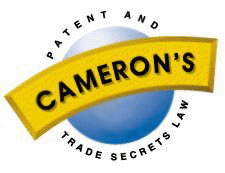
The Edison Bell Phonograph Corporation, Limited v.
Smith and Young
citation(s): [1894] 11 R.P.C. 389
 |
The Edison Bell Phonograph Corporation, Limited v.
|
copyright 1997 Donald M. Cameron, Aird & Berlis
At pp. 395-396
"But Lord Hatherley, in Arnold v. Bradbury, as an instance of what I have been saying, that you must look at the whole instrument, says you ought not to look at the claim in that way; you ought to read the Specification first to see what it is the man says he has invented, and what it is, therefore, that he proposes to patent, and having got that, then read his claim - read it fairly - and see whether then you find that the claim claims more than that which he has declared that he desires to patent, and what he describes as the thing to be done, and which he has invented."
At. 396
"They have used the exact thing that has been patented; they have used it to a considerable extent, but they say "Your patent is a bad one; you cannot sue upon it"; and they have taken, by way of objection, every one of the ordinary objections which are taken under such circumstances - that is to say, they spell every paragraph and every line in the patent, and try to persuade the Court that some one line, or some one sentence in it is so bad that it makes the whole of the patent bad, and prevents the inventor from having the benefit of his invention, however useful or however great it may be.
Those who take such objections as that must prove them strictly."
At p. 396
"It appears to you to be ambiguous, but any workman of ordinary skill in the trade who would have to apply that description would understand it only in one way, and would be able to act upon it." If that is true, then it is said that although grammatically, or with literary accuracy, there might be a doubt about it, there is no real business doubt about it, and the one meaning and the only meaning which you could attach to it is that which would strike an ordinary workman in the trade who would have to deal with it, and would strike him as the only way in which the work could be done."
At p. 396
"But every claim in every patent must be read and construed with reference to the Specification, and not as if the claim was an isolated sentence having no connection with or reference to what precedes it." Well, that is the rule which I think is the right one, and it is the same rule as you would apply to the construction of any instrument."
"That is the meaning of want of subject-matter? It is not the same thing as want of invention, or rather I should say as want of novelty: it is not the same thing as want of utility, but, where you cannot maintain either of those propositions which would be sufficient to destroy the patent, it is something else, which some one or other, at some time, has invented as an idea for destroying patents. And what is it? It really comes to this, that, although the invention is new - that is, that nobody has thought of it before - and although it is useful, yet, when you consider it, you come to the conclusion that it is so easy, so palpable, that everybody who thought for a moment would come to the same conclusion; or, in more homely language, hardly judicial, but rather businesslike, it comes to this, it is so easy that any fool could do it. Well, I look, as I say, upon that objection, when all others have failed, generally with amused contempt. It can be made out, but hardly ever."
Return to:
Cameron's IT Law: Home Page; Index
Cameron's Canadian Patent & Trade Secrets Law: Home Page; Index